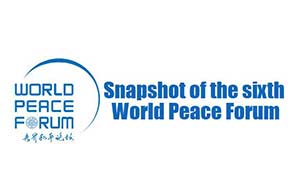HK has much to gain by supporting Belt and Road
China seeks to expand the Belt and Road (B&R) Initiative and seize new trade opportunities abroad while Hong Kong is called upon to play a "super-connector" role. This lets the city leverage its position in cultivating ties with nations along the B&R. The city likewise automatically gains invaluable prestige in the process.
As the project is designed to reach out to more than 4.4 billion people spanning 65 economies on three continents with an overall GDP of US$20 trillion, this is a game-changing and ambitious goal. Hong Kong definitely can contribute to making this goal achievable if it commits to it unreservedly.
As the B&R develops Hong Kong will become a springboard for mainland companies seeking to expand business abroad and a platform for foreign ones eager to engage the mainland. Meanwhile the initiative is starting to gain ground. According to the Hong Kong Monetary Authority 64 percent of foreign direct investments into the mainland and 62 percent of the mainland’s outward direct investments in 2015 were already made through Hong Kong.
But B&R should be perceived not just as a purely economic initiative. If carried out smoothly, with Hong Kong going along for the ride, it would project China’s soft power through the financial assistance offered to all participating countries. The Hong Kong brand is already well-respected as a leading financial and logistics hub, with expertise in project management and trade development. This truly is an excellent opportunity for Hong Kong to shine and benefit by playing an active role in ensuring the success of B&R.
While the mainland plays the role of a "global factory", Hong Kong emerges as an experienced and more advanced trader selling goods worldwide. It can only expedite the day when the mainland is crowned as the world’s biggest economy. Again Hong Kong stands to gain some glorious fallout from the event.
The pattern of a mother economy relying on a smaller but more agile and sophisticated center to push forward could be highly applicable to others. Other major countries can learn from this symbiotic relationship to make further progress economically without introducing sweeping painful reforms by establishing advanced regional hubs operating on a different set of rules, as in the case of the mainland and Hong Kong. In other words, some countries can clearly benefit enormously by adopting the proven "One Country, Two Systems" formula to stimulate progress. Just imagine the goodwill and prestige both the mainland and Hong Kong would gain along the B&R.
As a matter of fact, two major economies in Central Asia and Middle East — Kazakhstan and the United Arab Emirates — already rely on institutional patterns similar to "One Country, Two Systems" in promoting trade and development.
UAE is driven by the success of one of its seven sheikhdoms — Dubai. The city operates on a different set of rules and now 60 percent of all China’s goods to the region pass through its ports. It is also the most politically stable and innovative city in the region with 70 percent of its revenue coming from non-resource exports, a stunning achievement from a region where the export of oil and gas on average delivers 90 percent of revenue.
Astana, the capital of resource-rich Kazakhstan, is another example where relying on advanced hubs could deliver magnified benefits. The recent governmental 100 Concrete Steps initiative, a comprehensive national reform package, distinguishes Astana from the rest of Kazakhstan. Hence Astana seeks to appeal to foreign investments through attractive tax concessions, an English system of law and the Astana International Financial Center which copied many of Hong Kong’s best practices. This will undoubtedly further stimulate the Central Asian nation’s growth.
Clearly Hong Kong has much to gain by following mainland’s B&R Initiative. The city has much to teach most nations along the routes and will derive many financial and reputational gains in the process. By sharing its principles of governance, financial services, project management, legal compliance, intellectual property protection, fair judicial arbitration and mediation, and many of its other best practices, Hong Kong will most certainly attract more business for itself and in the process help to realize the goals of the B&R Initiative.
The author is an independent consultant with experience in Asian and Middle Eastern markets. He also writes for leading publications worldwide about international trade development and diplomacy.



















